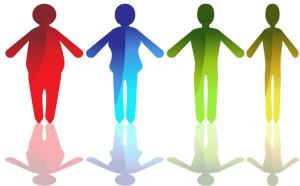
Eating Disorders
The term eating disorders refers to a collection of serious psychological conditions affecting our behaviour and attitudes around food. You will often hear the term eating disorder used to describe Anorexia, although this is only one of the conditions which fall under this umbrella term, the following disorders are all classed as eating disorders;
- Anorexia Nervosa
- Bulimia Nervosa
- Binge Eating Disorder
- Eating disorder not otherwise specified (EDNOS)
There are a number of other psychological problems, which although not eating disorders, have close links to the group of conditions;
- Body Dysmorphia
- Exercise disorders (Compulsive exercising, ‘Muscle Dysmorphia’)
Who develops an eating disorder and why?
Statistics from the NHS information centre (2004) estimates that around 1.6 million people in the UK are suffering from some form of disordered eating. Other studies have shown that around 2-4 in 10 sufferers of eating disorders will be male, however due to the poor quality of research and data available this number is thought to be inaccurate. In 2010 there were several information releases which showed worrying rises in the number of men and children being treated by the NHS for eating disorders proving the issue is bigger than once thought, warranting more research on the subject outside of the normal parameters of studies into teenage girls.
While not directly associated with eating disorders, other recent surveys has shown body dissatisfaction and low self-esteem is at an all-time high in the UK population, particularly in young people, which could help fuel an existing predisposition to an eating disorder.
The most common age of onset of eating disorders tend to be in a sufferers teenage years, although people of all ages can develop and struggle with problems around an unhealthy relationship with food, Binge Eating Disorder is particularly associated with a later age of onset, with many people finding it an issue during mid-life.
Many risk factors affect the development of eating disorders and experts in the past have toyed with the idea of a genetic link and disposition, however external factors have a large part to play in their development, some risk factors have been identified as;
- Sufferers were overweight / teased about their size,
- Sufferers already diet obsessively or have grown up around a culture of restrictive eating and constant dieting.
- They participate in a sport or hold a career which has particular ties to a certain body build, be it thin or muscular.
- Societal pressures to achieve ideals, growing pressure on young people to aspire to physical and general ideals.
Although these risk factors are commonly reported, it is important to remember that eating disorders are complex issues, often with the behaviours being used to deal with difficult thoughts, feelings or emotions that they cannot otherwise express. It is often found in practice that there are a variety of issues behind a sufferers relationship with food and commonly include emotional difficulties as a result of bullying, family difficulties or traumatic life events. Sufferers of eating disorders will also commonly suffer from other mental health issues including depression, self-harming behaviours, social anxiety and a severe disturbance in body image.
Stigma
There is a particular stigma attached to eating disorders and they are surrounded by myths and misconceptions, with some of those most common being;
- People who have eating disorders are just overly concerned about their appearance,
- They only affect teenage girls,
- That everyone with an eating disorder suffers from Anorexia,
- They are a physical illness.
These myths and misconceptions are not helped by the media, who frequently report inaccurately on the topic, making sufferers appear self centred, vain and obsessed with the way they look. They often completely overlook the very fact that they are psychological conditions, instead concentrating on the physical attributes of the disorders.
Support
Treatment and support is available to sufferers of all eating disorders and despite what is often reported, sufferers can go on to make a full recovery, we always suggest seeing your GP if you are showing any signs or symptoms of an eating disorder. There are also networks of self-help groups available throughout the country and various self-help books, support organisations and resources available to those concerned about themselves, a friend or relative. Please see the guides below for further information and guidance.
Find an eating disorder therapist
With thanks to Nick Watts from Men Get eating disorders too for helping us put together our eating disorders section of this site.
Related Guides
















